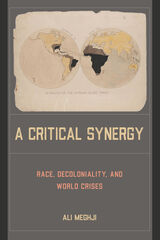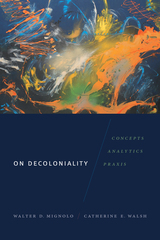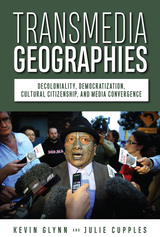4 books about Decoloniality

A Critical Synergy
Race, Decoloniality, and World Crises
Meghji, Ali
Temple University Press, 2023
Practitioners of decolonial theory and critical race theory (CRT) often use one or the other, but not both. In his provocative book, A Critical Synergy, Ali Meghji suggests using the two theories in tandem rather than attempting to hierarchize or synthesize them. Doing so allows for the study of social phenomena in a way that captures their global and historical roots, while acknowledging their local, national, and contemporary particularities.
The differences between decolonial thought and CRT, Meghji insists, does not necessarily imply one approach is stronger. Rather, he asserts, they often provide alternative but not incompatible viewpoints of the same social problem. Meghji presents case studies of capitalism, the COVID-19 pandemic, climate crisis, and twenty-first-century far-right populism to show that with both theories, we can understand more, as insights may be lost by using only one.
Meghji is not calling for a universal theoretical synthesis in A Critical Synergy, but rather a practice that can help open sociology and social science to the tradition of pluriversality much more broadly.
The differences between decolonial thought and CRT, Meghji insists, does not necessarily imply one approach is stronger. Rather, he asserts, they often provide alternative but not incompatible viewpoints of the same social problem. Meghji presents case studies of capitalism, the COVID-19 pandemic, climate crisis, and twenty-first-century far-right populism to show that with both theories, we can understand more, as insights may be lost by using only one.
Meghji is not calling for a universal theoretical synthesis in A Critical Synergy, but rather a practice that can help open sociology and social science to the tradition of pluriversality much more broadly.
[more]

On Decoloniality
Concepts, Analytics, Praxis
Walter D. Mignolo and Catherine E. Walsh
Duke University Press, 2018
In On Decoloniality Walter D. Mignolo and Catherine E. Walsh explore the hidden forces of the colonial matrix of power, its origination, transformation, and current presence, while asking the crucial questions of decoloniality's how, what, why, with whom, and what for. Interweaving theory-praxis with local histories and perspectives of struggle, they illustrate the conceptual and analytic dynamism of decolonial ways of living and thinking, as well as the creative force of resistance and re-existence. This book speaks to the urgency of these times, encourages delinkings from the colonial matrix of power and its "universals" of Western modernity and global capitalism, and engages with arguments and struggles for dignity and life against death, destruction, and civilizational despair.
[more]

Transmedia Geographies
Decoloniality, Democratization, Cultural Citizenship, and Media Convergence
Kevin Glynn
Rutgers University Press, 2025
Looking at the US, New Zealand, and Central America, this book considers how cultural politics has been deeply reworked in our contemporary media environment. The authors analyze how rampant technological convergence has allowed stories to spill across media platforms as well as geographical borders, and how those stories re-emerge as transmediated events.
The authors explore the cultural politics that have developed within this new media environment by moving across the mediated landscapes of the first, third and fourth (Indigenous people’s) worlds, which are deeply intertwined and interconnected under contemporary conditions of neoliberal globalization and emergent regimes of authoritarian post-democracy. The book attends both to the platforms and digital networks of the new media environment and to the cultural forms and practices that have constituted television as the dominant medium of communication throughout the second half of the twentieth century. In the new media environment, transmediation works on behalf not only of those corporate mega-conglomerates that have become all too familiar to media consumers around the world, but also for many communities that have previously been excluded from access to the means of electronic textual production and circulation. For the latter, grassroots transmediation has become an important technique for the production of cultural citizenship.
The authors explore the cultural politics that have developed within this new media environment by moving across the mediated landscapes of the first, third and fourth (Indigenous people’s) worlds, which are deeply intertwined and interconnected under contemporary conditions of neoliberal globalization and emergent regimes of authoritarian post-democracy. The book attends both to the platforms and digital networks of the new media environment and to the cultural forms and practices that have constituted television as the dominant medium of communication throughout the second half of the twentieth century. In the new media environment, transmediation works on behalf not only of those corporate mega-conglomerates that have become all too familiar to media consumers around the world, but also for many communities that have previously been excluded from access to the means of electronic textual production and circulation. For the latter, grassroots transmediation has become an important technique for the production of cultural citizenship.
[more]

Visual Disobedience
Art and Decoloniality in Central America
Kency Cornejo
Duke University Press, 2024
In Visual Disobedience, Kency Cornejo traces the emergence of new artistic strategies for Indigenous, feminist, and anticarceral resistance in the wake of torture, disappearance, killings, and US-funded civil wars in Central America. Cornejo reveals a direct line from US intervention to current forms of racial, economic, and gender injustice in the isthmus, connecting this to the criminalization and incarceration of migrants at the US-Mexico border today. Drawing on interviews with Central American artists and curators, she theorizes a form of “visual disobedience” in which art operates in opposition to nation-states, colonialism, and visual coloniality. She counters historical erasure by examining over eighty artworks and highlighting forty artists across the region. Cornejo also rejects the normalized image of the suffering Central American individual by repositioning artists as creative agents of their own realities. With this a comprehensive exploration of contemporary Central American art, Cornejo highlights the role of visual disobedience as a strategy of decolonial aesthetics to expose and combat coloniality, heteropatriarchy, white supremacy, empire, and other systems of oppression.
[more]
READERS
Browse our collection.
PUBLISHERS
See BiblioVault's publisher services.
STUDENT SERVICES
Files for college accessibility offices.
UChicago Accessibility Resources
home | accessibility | search | about | contact us
BiblioVault ® 2001 - 2024
The University of Chicago Press









